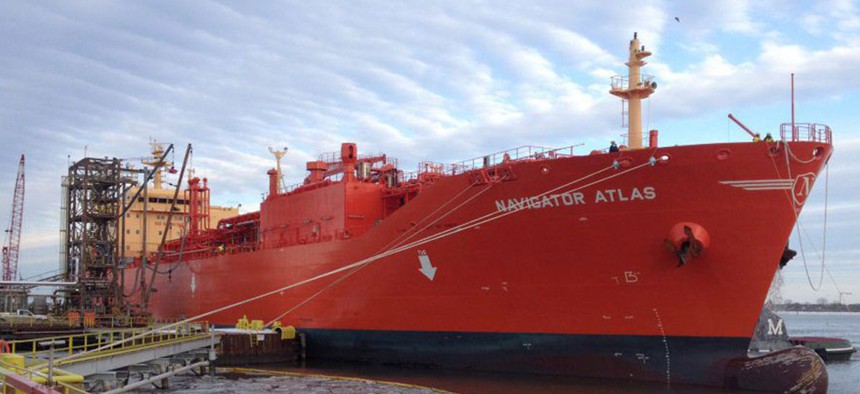
The Paradise Papers ties Ross to Navigator Holdings. Navigatorgas.com
The Company Linking Wilbur Ross To Putin Cronies Has a Key Role In Trump’s Energy Plan
Navigator Holdings—where the commerce secretary's business, administration policy, and Russian influence converge.
The news that Donald Trump’s commerce secretary, Wilbur Ross, owns a stake in a company with links to the Kremlin has raised questions about whether Ross may have a personal conflict of interest. But there’s another reason the company is interesting: It’s involved in a key part of Trump’s energy policy, which is to increase US gas and chemical exports.
Ross, through an offshore entity, owns a stake in shipping company Navigator Holdings, journalist consortium ICIJ reported on Nov. 5. One of Navigator’s customers, Sibur, is a company partly owned by the son-in-law of Russian president Vladimir Putin and another businessman who is under US sanctions, ICIJ said.
Navigator calls itself the world’s “largest fleet of natural gas carriers”; it owns 38 ships that transport liquefied natural gas (LNG) and other chemicals. On July 12, Navigator announced an agreement to develop an ethylene marine export terminal in Houston. Ethylene is used to make everything from plastics to antifreeze.
“A strategically located ethylene export terminal is the key to unlocking growing petrochemical production capacity in the US,” CEO David Butters said at the time. The US plans to increase ethylene production capacity by 45% between 2016 and 2020, the company noted. Navigator’s stock price rose more than 35% after the announcement.
Exporting LNG and industrial chemicals from the US has been describedas the “centerpiece” of Trump’s energy plan, despite resistance from US manufacturers who fear their LNG bills will go up, and a market glut(paywall) that threatens profitability. Speaking about the exports, former Texas governor Rick Perry, who is now the US energy secretary, told officials in Beijing in June, “My role is to make sure that the facilities are as operational and open for business as quickly as they can be.”
Ross’s 57-page financial disclosure form, released in January, indicates he was director/chairman of Navigator Holdings from January 2012 until November 2014. It lists the company twice under his many “employment assets and income and retirement accounts,” but doesn’t say how much his stake was worth.
In July, Wendy Teramoto, a long-time associate of Ross’s who now works with him at the Department of Commerce, retired from the boardof Navigator. She was replaced by an appointee from WL Ross, Ross’s investment company, which he pledged to divest from when he was appointed to the cabinet.
Ross “was not involved with Navigator’s negotiations to engage in business with Sibur,” a commerce department spokesman said Monday, and had “never met the Sibur shareholders referenced in this story and, until now, did not know of their relationship.”
Ross was only asked about Russia briefly during his confirmation hearing (pdf) with the Senate in January. On the possibility of a cyber-attack by Russia, North Korea or another hostile power, Ross said “the danger is both large and imminent,” (p. 91) but wouldn’t agree specifically that economic sanctions were necessary. On Russia’s embargo of US seafood imports, in response to US sanctions, Ross said “We need to find a way to deal with it” (p. 104), and he agreed that the US should compete with Russia in Arctic exploration (p. 105).
Maria Cantwell, the Democratic senator from Washington state, was much more pointed, asking (p. 108) specifically “How will you shift your focus to represent the interest of the American people rather than your Russian partners?”
In his answer, Ross focused only on the Bank of Cyprus, where he and Russians close to Putin had invested and served on the board. “I have only met once, for one hour, the principal Russian investor, and then only after he had invested in the Bank,” he said. There was no mention of Navigator.






